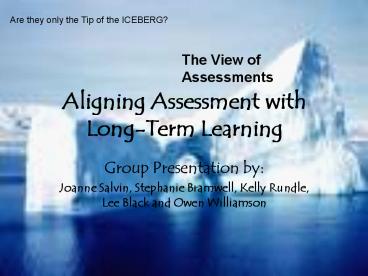Aligning Assessment with LongTerm Learning - PowerPoint PPT Presentation
1 / 16
Title:
Aligning Assessment with LongTerm Learning
Description:
Joanne Salvin, Stephanie Bramwell, Kelly Rundle, Lee Black and Owen Williamson ... There are 3 main aims of higher education and they are: ... – PowerPoint PPT presentation
Number of Views:57
Avg rating:3.0/5.0
Title: Aligning Assessment with LongTerm Learning
1
Aligning Assessment with Long-Term Learning
Are they only the Tip of the ICEBERG?
The View of Assessments
- Group Presentation by
- Joanne Salvin, Stephanie Bramwell, Kelly Rundle,
Lee Black and Owen Williamson
2
Introduction
- The Purpose of Higher Education
- Short Term vs Long Term
- There are 3 main aims of higher education and
they are1) Specific attention on the learning
outcomes of - a student (Hussey and Smith, 2003)2) The
increase of a students key skills and
ability to adopt into the role of employment.
(Dearing, 1997)3) Lastly the development of
independence. (Stephenson and Yorke, 1998)
3
Boud, (2000)
- Boud, (2000) the needs of assessment in an
educated culture were recognized and the
obligation for a new way of thinking about
assessment established. - It was therefore thought that the assessment
should be evaluated from whether they
successfully provide students for a lifetime of
education which allows them to assess their own
knowledge.
4
Purposes and problems of assessment
- Two main purposes of assessment
- First is to provide certification of achievement
- Second is to facilitate learning
- These have been associated with two sets of
practices summative and formative learning
5
Purposes and problems of assessment
- In considering learning for the long-term, the
question arises of whether summative and
formative assessment practices are able to
adequately address a wider set of needs. - Can they and do they equip students for a
lifetime of learning?
6
Purposes and problems of assessment
- Summative assessment has the clear purpose of
certifying a level of attainment of a student - Knight (2002) suggests that summative assessment
is a practice is such disarray that it is
difficult to know what grades mean and risky to
treat them as reliable
7
Purposes and problems of assessment
- Similarly, formative assessment has been the
subject of debate in recent years - Black and Williams (1998) study identified
issues that had not been fully addressed - More recently Yorke (2003) has also put forward
an argument - Hounsell (2003) also has similar views as Yorke
on feedback
8
Purposes and problems of assessment
- Hounsell (2003) proposes two directions for
development - Firstly student involvement in the generation of
feedback - Secondly a more open and collaborative approach
to assignments
9
Purposes and problems of assessment
- The problems with assessment have been identified
by the QAA and they are working towards
rectifying this
10
Some main points of the illustrations of thinking
about everyday practice
Practices to align higher education and long term
learning
- Emphasizes importance of context
- Involves working together with others
- Requires portrayal of outcomes for different
purposes - Considers risk and confidence of judgements
- Builds learner agency and constructs active
learners
11
Practices to align higher education and long term
learning
Together the practices develop six powerful
forces in education Activity
Expectations Cooperation Interaction
Diversity Responsibility
12
Current Assessment in Higher Education
aligned with long-term learning
- Assessment in Higher Education today
- Objectives of modules of the course
- Demonstrate an understanding
- Methods of assessment include
- Exams
- Essays
- Presentations
- Group work
- Project work
- Multiple Choice Tests
- Case Studies
13
Current Assessment in Higher Education aligned
with long-term learning
- Key-skills
- Communication
- Working with others
- Developing own learning performance
- I.T.
- English
- Numerical
- Critical thinking
- Problem Solving
- Managing Information
- Examples of Summative and Formative Assessment
- Effective Feedback
14
Assessment Improvements
- Adaptation to the Student
- Possible Suggestions to Adaptation of courses
to fit the Students Long-Term Learning
15
Nightingale et al (1996)
- 8 Broad Categories of Learning
- Thinking critically and making judgements
- Solving problems and developing plans
- Performing procedures and demonstrating
techniques - Managing and developing oneself
- Accessing and managing information
- Demonstrating knowledge and understanding
- Designing, creating, performing
- Communicating
16
Thank You, Donations Are Accepted on the Way Out
Conclusion
YOU MAY NOW STAND AND APPLAUDE DONT BE SHY































